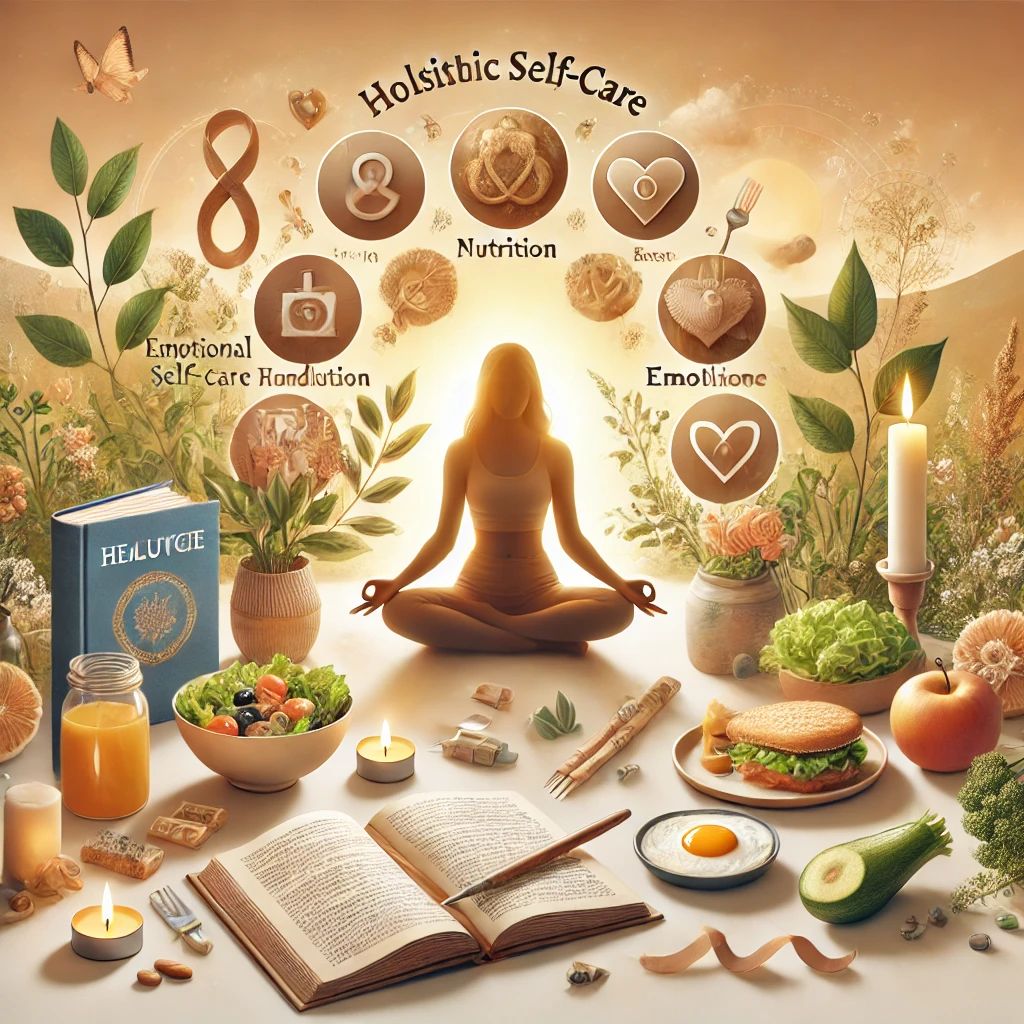
What is Holistic Self-Care?
Holistic self-care is a comprehensive approach to well-being that focuses on nurturing all aspects of the self—mind, body, and spirit. Instead of treating isolated symptoms or focusing on just one area of health, holistic self-care emphasizes balance and harmony across all facets of life. By integrating practices that support physical, mental, emotional, and spiritual well-being, holistic self-care promotes a healthier, more fulfilling life.
Why is Holistic Self-Care Important?
Holistic self-care recognizes that well-being is interconnected, meaning that one area of health can affect others. For example, stress can weaken the immune system, while physical illness can lead to emotional strain. By addressing the whole self, holistic self-care helps prevent burnout, reduces stress, and enhances resilience, enabling you to live a balanced and joyful life.
Key Components of Holistic Self-Care
Here are the essential areas to focus on when practicing holistic self-care:
1. Physical Self-Care
Caring for your body is foundational to holistic health. This includes adopting habits that improve physical fitness, nutrition, and overall well-being:
Exercise regularly: Engage in physical activities that you enjoy, such as yoga, walking, swimming, or strength training. Exercise boosts your mood, improves cardiovascular health, and strengthens muscles and bones.Eat nourishing foods: Focus on a balanced diet that includes plenty of whole foods, such as fruits, vegetables, lean proteins, and healthy fats. Nutrient-dense foods provide the fuel your body needs to function optimally.Prioritize sleep: Aim for 7-9 hours of quality sleep each night. Sleep is crucial for physical recovery, cognitive function, and emotional stability.Stay hydrated: Drink plenty of water throughout the day to support digestion, energy levels, and skin health.2. Mental Self-Care
Mental self-care involves practices that stimulate your mind, reduce stress, and promote mental clarity:
Practice mindfulness: Mindfulness techniques, such as meditation or deep breathing exercises, can help you stay present, manage stress, and calm the mind. These practices promote mental clarity and emotional balance.Challenge your mind: Keep your brain active by learning new skills, solving puzzles, reading, or engaging in creative activities like painting or writing. Mental stimulation helps improve cognitive function and reduces the risk of memory decline.Set boundaries: Protect your mental health by setting healthy boundaries with others. Know when to say no to activities or commitments that drain your energy or cause stress.3. Emotional Self-Care
Emotional self-care involves recognizing and nurturing your feelings, managing stress, and creating healthy emotional habits:
Acknowledge your emotions: Allow yourself to feel and process your emotions without judgment. Bottling up feelings can lead to emotional overwhelm, so it’s important to express your emotions in healthy ways.Practice self-compassion: Be kind to yourself, especially during difficult times. Treat yourself with the same empathy and understanding you would offer a friend.Create a support system: Surround yourself with positive relationships that nurture your emotional well-being. Whether it’s friends, family, or a therapist, having a support network helps you navigate life’s challenges with greater resilience.4. Spiritual Self-Care
Spiritual self-care is about connecting with something greater than yourself, whether that’s through religion, nature, or personal reflection:
Meditation and prayer: Engage in meditation, prayer, or quiet reflection to connect with your inner self and gain clarity. These practices provide a sense of peace and purpose.Spend time in nature: Being in nature helps you reconnect with the world around you, reducing stress and promoting spiritual well-being. Take time for walks in the park, hikes, or simply sitting outdoors to enjoy the beauty of the natural world.Explore your purpose: Take time to reflect on your values, beliefs, and purpose in life. Journaling or engaging in self-reflection can help you gain insight into what drives you and how you can live a more meaningful life.5. Social Self-Care
Humans are social beings, and maintaining strong social connections is vital for emotional and mental health:
Build meaningful relationships: Spend time with people who uplift and support you. Cultivating positive, authentic relationships helps create a sense of belonging and emotional safety.Engage in community: Find ways to connect with others, whether it’s through volunteering, joining a club, or participating in group activities. Social engagement boosts happiness and helps you feel more connected.Balance alone time and social time: While it’s important to connect with others, don’t forget to schedule alone time for self-reflection and rest. A healthy balance of social interaction and solitude is key to emotional well-being.6. Self-Care Rituals and Practices
Incorporating daily or weekly self-care rituals can help you stay balanced and aligned with your holistic self-care goals:
Create morning and evening routines: Establish a routine that sets a positive tone for your day. This might include stretching, journaling, or practicing gratitude in the morning and winding down with meditation or reading at night.Practice gratitude: Take a few minutes each day to reflect on the things you are grateful for. Gratitude shifts your mindset toward positivity and helps reduce stress.Use aromatherapy: Scents like lavender, eucalyptus, or citrus can create a calming environment, helping you relax and center yourself during stressful moments.Conclusion: Embrace Holistic Self-Care for a Balanced Life
Holistic self-care is about taking a whole-body approach to well-being, focusing on nurturing your physical, mental, emotional, and spiritual health. By integrating small daily practices—such as regular exercise, mindfulness, balanced nutrition, and building meaningful relationships—you can create a more harmonious and fulfilling life. Remember, self-care is not selfish; it is a necessary foundation for living a healthy, balanced, and joyful life.
The article was prepared by Lyle Gardner.



